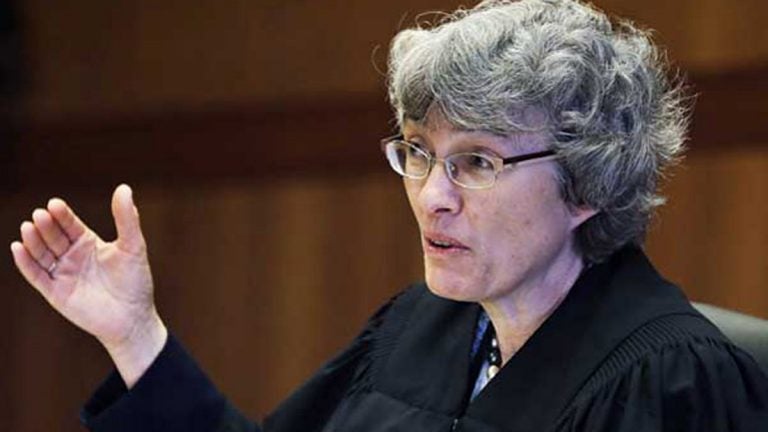New Jersey judge ruling a set back for rural school districts seeking Abbott-style funding
Listen
Superior Court Judge Mary Jacobson.
In a closely watched case, a Superior Court judge yesterday ruled against 16 rural school districts in New Jersey seeking relief in the wake of the Gov. Chris Christie’s cuts to school funding that they maintained left them unable to fulfill the state’s constitutional mandate for a “thorough and efficient” education.
State Superior Court Judge Mary Jacobson, in an oral ruling from the bench as assignment judge for the Mercer County court, yesterday dismissed the districts’ motion for a summary judgment in the long-running case known as Bacon v. NJ Department of Education, according to the districts’ lawyers.
The districts had sought enforcement of a 2008 decision that called for additional aid for their schools in mostly low-income South Jersey communities, maintaining Christie had underfunded the districts and specifically failed to meet requirements for quality preschool programs. Oral arguments on the case took place last Thursday.
A transcript of Jacobson’s decision was not available, nor was a written decision released. The districts’ lawyers said in confirming the ruling that it was more technical than one on the merits of the overall case.
Jacobson in oral arguments last week raised concerns about the districts’ reliance on 2009 assessments of their schools’ needs in making their case, ones that she said could be outdated by now.
“The judge’s decision was technical, rather than substantive, in nature,” wrote lawyers for the Education Law Center, the Newark-based group that represented the districts, in a communication to the districts yesterday.
“It was based on court rules, and she made no finding based on the underlying issues,” the communication continued to the districts. “However, she was unwilling to grant the relief requested through a summary proceeding, without a record of what has happened in your districts since the 2009 needs assessment.”
A spokesman for the state Department of Education declined to comment on the decision.
The impact of the decision beyond the 16 districts is uncertain. But the Bacon case has been seen as a sequel to the state’s landmark Abbott v. Burke school equity rulings and a possible harbinger of the court’s willingness to expand the Abbott mandates, or at least demand that the Christie administration fully fund the state’s School Funding Reform Act.
Jacobson’s decision takes the administration off the defensive as it starts to put together its state budget for next year, where school funding remains a third of the state’s overall spending and sure to be a hot-button topic going into the new political year.
What’s next for the Bacon districts is uncertain as well; they have been steadfast in pursuing their case over the past two decades and now need to regroup. Their attorney indicated last night that the matter was hardly closed with Jacobson’s decision.
“The students in these poor schools are entitled to adequate resources and preschool,” said David Sciarra, the ELC’s executive director who argued the case last Thursday.
“We’ll be talking to local educators in these districts to consider legal options in light of this development,” he said.
The full list of affected districts is Buena Regional, Clayton, Commercial, Egg Harbor, Fairfield, Hammonton Township, Lakehurst, Lakewood, Lawrence, Little Egg Harbor, Maurice River, Ocean Township, Quinton, Upper Deerfield, Wallington, and Woodbine.
_________________________________________
NJ Spotlight, an independent online news service on issues critical to New Jersey, makes its in-depth reporting available to NewsWorks.
WHYY is your source for fact-based, in-depth journalism and information. As a nonprofit organization, we rely on financial support from readers like you. Please give today.




